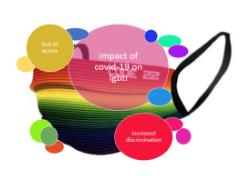LGBTI movement asks for protection of rights during COVID-19 outbreak

5 June 2020 - Today, GALE joined a coalition of 187 organizations to draw the attention of the UN Human Rights Council to the situation of LGBTI persons and those who defend their rights in the context of the COVID-19 pandemic outbreak. The coalition urged States and stakeholders to ensure that this public health emergency will neither exacerbate existing misconceptions, prejudices, inequalities or structural barriers, nor lead to increased violence and discrimination against sexually and gender diverse persons.
COVID-19 no reason to discriminate (again)
The coalition stresses two reasons to be alert. The first is that LGBI people are more strongly hit by the negative health and economic consequences of the pandemic, due to already existing exclusion and discrimination. The second reason is that some governments use the epidemic to tune down LGBTI-protections and to increase discrimination towards LGBTI.
The coalition acknowledges that we need swift action now. But is also stresses that states must comply with international human rights obligations when doing this. Vulnerabilities of specific groups - including LGBTI persons - must be taken into account. This can only be done by involving LGBTI civil society in planning the response.
Risks of LGBI in education
The coalition specifically names the general rise of stigma, less access to housing, negative consequences of social distancing, less access to work and less social and political participation as areas where LGBTI are more severely disadvantaged. GALE also wants to focus on the negative consequences for LGBTI-students and teachers.
Like victims of sexual abuse, LGBTI-youth in lockdown situations are convicted to stay home in situations that may be risky for their well-being. The social distancing is even more disastrous for young LGBTI people who cannot find social support in their community but have to go to safe places. The limitation to online socializing puts LGBTI students at risk of homophobic and transphobic abuse and possibly of getting entrapped in unsafe relational or sexual encounters. LGBTI students are already more at risk to drop out, and this may increase because of them lagging further behind. LGBI students with medical needs may be refused services due to their identity expression.
LGBTI teachers may be more at risk to loose their job. This effect was already shown when Greece was pushed into an economic crisis by the European Union. The workforce had to be thinned and the most vulnerable teacher were fired first. This was not only an economic danger for LGBTI teachers, but it also stifled LGBTI-led initiatives to improve the sexual and gender situation in schools.


